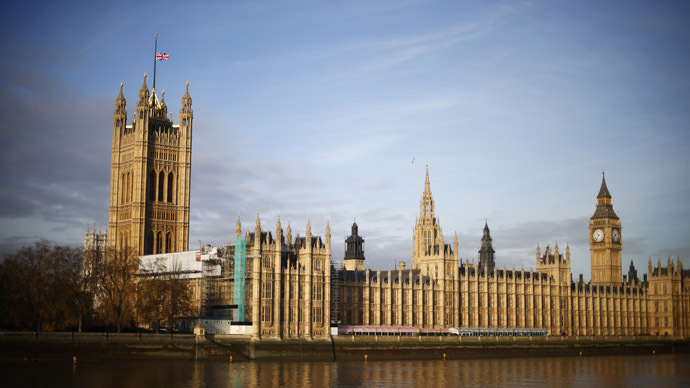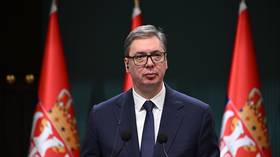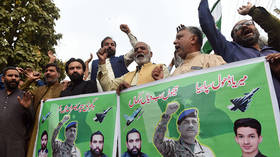Corruption: Chronic UK disease infecting establishment, dragging country backwards

Just as the British government announces the deployment of troops to Ukraine as ‘advisors’, it is rapidly becoming apparent that the average Member of Parliament in the UK is as crooked as Uri Geller’s cutlery.
The most recent political scandal to engulf a country that has had more than its fair share in recent years, involves two former foreign secretaries – Sir Malcolm Rifkind and Jack Straw – offering their services as paid consultants to representatives of a fake Chinese company. Unbeknown to both politicians, the representatives were actors and the Chinese company they were representing was entirely fictitious. They’d been set up by UK broadcaster Channel 4, which secretly filmed the meetings and later broadcast them as part of the channel’s popular documentary series: ‘Dispatches’. The footage of both men – two of the most senior politicians in the country - discussing their prospective fee was as damning as it gets, casting another harsh light onto a British political establishment that lurches from once scandal to another, bringing the country’s political system into disrepute.
Of course, every nation finds itself embroiled in political scandal from time to time. And every country has had its share of corrupt politicians and public officials. But the UK seems to churn out these scandals and corrupt officials to such an extent it leaves the distinct impression that it’s the norm rather than the exception.
Both Labour and the Tories, the two main UK parties of government, are up to their necks in this particularly British disease. When politicians from both parties are not fiddling and defrauding their expenses – drawing up fraudulent invoices, claiming for this, that, and the other, including in one case a subscription to a pornographic television channel – they are pointing their greasy fingers at other countries and governments, lecturing them on democracy, international law, and proper conduct. It is akin to being told to sit up straight by a hunchback.
There is little sympathy in the UK for politicians who are found to be on the ‘make’ at a time when millions have been reduced to poverty and destitution by the policy of austerity – an extreme and disastrous response to an economic crisis caused by the greed and reckless behavior of the nation’s banks and financial institutions. Nineteenth century levels of inequality are now entrenched in British society as a consequence, illustrative of a society that is travelling back in time.
READ MORE: Rifkind resigns as MP & Committee Chair over ‘cash for access’ sting
In fact, the stench of corruption pervades the entire British establishment. The police, the media, Parliament, even the Royal Family have all been engulfed in scandals of one type or another in recent months and years. And this is before we even come on to the City of London and those previously mentioned banks. Recent revelations that the British-owned bank HSBC was involved in aiding some very rich account holders evade tax via its Swiss branch, as well as allegations regarding its involvement in money laundering, came as further evidence that the German playwright Bertolt Brecht was right when he said that it is a greater crime to own a bank than to rob a bank.
All this comes at a time of growing anger at the delay in the publication of the Chilcot report into the Iraq War. Rumor has it that Sir John Chilcot’s report will contain harsh criticism of the major players involved in the controversial decision to join the Bush administration in unleashing a war that resulted in biblical levels of devastation, loss of life, and human suffering. Iraq has never recovered, consumed 12 years later with sectarian violence, poverty, and despair.
The inquiry that formed the basis of the Chilcot report ended four years ago, and despite the fact it had no legal power to recommend criminal proceedings on the basis of its findings, it is a disgrace that they are yet to be made public.
Among those key players expected to be criticized in the report is Jack Straw, who was Tony Blair’s foreign secretary in the run-up to the war. As mentioned, Straw is one of the politicians embroiled in this latest scandal, though given the lingering controversy over Iraq, which in Britain today hardly anybody believes was a just and legal war, and allegations surrounding his role in sanctioning the torture of prisoners as part of the Bush administration’s ‘war on terror’, this latest scandal is small potatoes. Many believe that along with Tony Blair and other key members of the Blair government responsible for taking Britain to war in Iraq, Jack Straw should be facing war crimes charges at the International Criminal Court at The Hague.
You might think, given the way that Britain’s role in devastating Iraq remains a political issue in the country twelve years on, that Downing Street and its allies would have learned some valuable lessons on the dangers of engaging in military intervention around the world. Alas, evidently not. The announcement that British troops are to be sent to Ukraine constitutes a dangerous and nonsensical provocation. It tells us everything we need to know about a government that would rather engage in military deployments than peace talks.
When they are not being bought and paid for at home, senior politicians in the UK are burnishing their military credentials by vowing to fight to the last drop of other people’s blood overseas.
It leaves no doubt that in 2015 Britain has the best democracy that money can buy.
The statements, views and opinions expressed in this column are solely those of the author and do not necessarily represent those of RT.
The statements, views and opinions expressed in this column are solely those of the author and do not necessarily represent those of RT.













